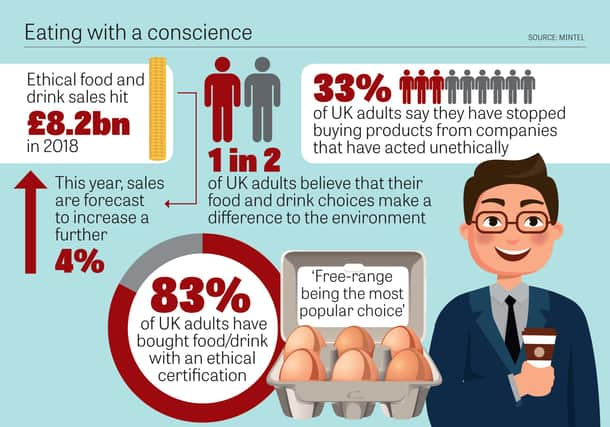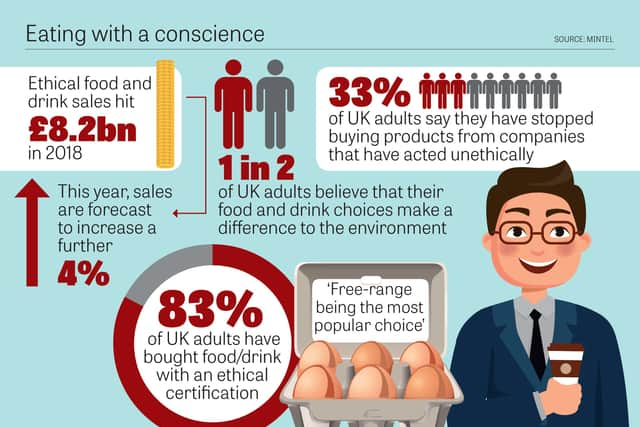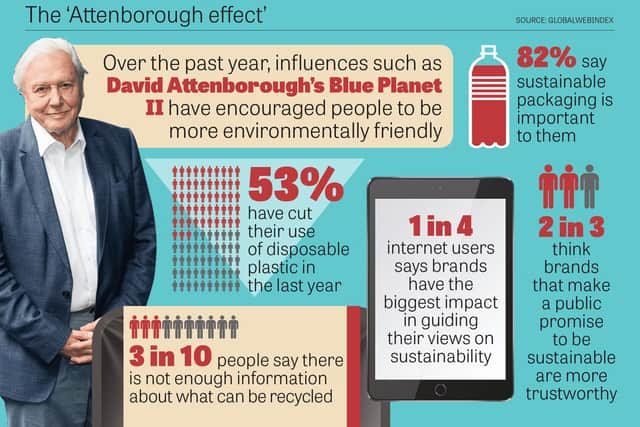Why caring consumers are buying more ethical goods - and what you think of the fight against plastic


Shoppers are buying more ethically than ever before - according to new research.
Figures show that last year the nation spent £8.2bn on ethical food and drink, including organic, Fairtrade, Rainforest Alliance and Marine Stewardship Council (MSC) certified products.
Advertisement
Hide AdAdvertisement
Hide AdOver the past five years, sales of ethical food and drink have shot up by 43 per cent from £5.7 billion in 2013. This year, sales are forecast to increase a further four per cent to reach £8.6 billion.


The sector’s ongoing popularity is set to continue, as sales of ethically certified food and drink are projected to rise by 17 per cent to reach £9.6bn between 2019-23.
This popularity is widespread, as today, a caring 83 per cent of UK adults say they have bought food/drink with some sort of ethical certification. Proving a hit with more mature Brits, those most likely to buy ethically-certified food/drink are aged over 55 (87%).
But while ethical food and drink is growing in popularity, research by Mintel reveals that cost is a significant barrier, as seven in ten adults say that eating sustainably/ethically is harder when money is tight.
Graphic by Kimberley Mogg


Advertisement
Hide AdAdvertisement
Hide AdConfusion is having an impact too, as six in ten say that it is difficult to know the differences between the various sustainable/ethical schemes.
Alice Baker, Mintel Research Analyst said: "Ethical food and drink has enjoyed strong sales growth in recent years, but price poses a significant barrier to greater uptake.
"This makes it imperative for companies to demonstrate to consumers how they can shop ethically without breaking the bank and how ethical products can – in some cases – even be the financially-savvy option. Drawing attention more strongly to where standard own-label products have ethical certifications would allow retailers to demonstrate to shoppers that they can buy ethically and potentially save money too.
"Products using surplus produce, for example the ‘wonky veg’ boxes offered by various supermarkets, can also be presented as both a financially-savvy option and an ethical one to tackle food waste.” Comments Alice.
Waging a war on plastic
Advertisement
Hide AdAdvertisement
Hide AdFollowing the television series Blue Planet II, it seems the 'Attenborough effect' is having an impact on plastic use as seven in ten (67%) UK adults have made efforts to reduce the amount of plastic packaging they bought in the year to February 2019.
Keen to cut back on plastic waste, six in ten (60%) Brits say they would be happy to use their own containers at supermarkets (ie for carrying meat or fish). But while consumers are keen to do their part to reduce waste, eight in ten (83%) Brits believe that retailers should do more to help reduce packaging waste.
Graphic by Kimberley Mogg
Around half (48%) of UK adults say they are loyal to companies/brands whose ethics align with their own, rising to 56% of under-25s. In fact, a third (33%) of UK adults say they have stopped buying products from companies that have acted unethically, rising to 43% among under-25s.
While 49% of UK adults believe that their food and drink choices make a difference to the environment, slightly more (51%) disagree or are unsure whether or not this is true. This highlights the importance of reassuring consumers that their shopping actions have an impact.
Advertisement
Hide AdAdvertisement
Hide AdAlice added: “The recent climate change protests have pushed sustainability high up on the news agenda. The food and drink industry is under growing pressure to take action on issues such as carbon emissions, plastic pollution and food waste. However, any actions here can only be truly effective in tackling these issues if companies are able to persuade shoppers to buy sustainably/ethically certified products on a regular basis.
"Consumers’ doubts over whether their buying choices make a difference to the environment present a significant barrier, likely causing apathy and inertia. Companies must therefore make the benefits of buying ethical food/drink to the environment, and to wider society as a result, more tangible to shoppers.”
Free-range tops ethical purchases
Free-range was ranked at 66 per cent as the most widely bought food with an ethical certification; a claim which is widespread in selected everyday categories like eggs and chicken. In fact, concern over animal welfare (45%) is the number one reason for buying any food/drink with an ethical certification.
Meanwhile, Fairtrade ranks as the nation’s second most popular ethical food and drink, bought by around half (53%) of people in Britain. Foods with a Red Tractor certification are bought by 49 per cent of consumers and organic foods are purchased by 30 per cent.
Advertisement
Hide AdAdvertisement
Hide AdEnvironmental sustainability appears to chime among under-35s, who show higher purchasing of food/drink with related certifications. A third (32%) of 16-34s buy Rainforest Alliance products, compared to an average of 25 per cent of Brits; while 30 per cent buy products with the FSC (Forest Stewardship Council) label on-pack, compared to an average of 20 per cent.
Alice added: “Free-range is a long-established label that spans various products, including eggs, poultry and – latterly – dairy products, including milk and yogurt. The intuitively tangible animal welfare image of free-range undoubtedly underpins its popularity."